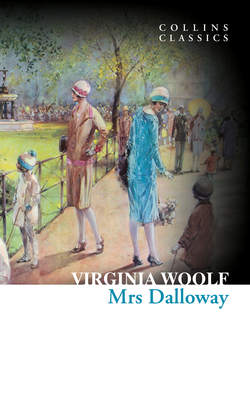Mrs Dalloway

Реклама. ООО «ЛитРес», ИНН: 7719571260.
Оглавление
Вирджиния Вулф. Mrs Dalloway
MRS DALLOWAY. Virginia Woolf
History of Collins
Life & Times. Mental Health and Creativity
Mrs. Dalloway and To the Lighthouse
The Bloomsbury Set
Mrs. Dalloway
CLASSIC LITERATURE: WORDS AND PHRASES. adapted from theCollins English Dictionary
Copyright
About the Publisher
Отрывок из книги
In 1819, millworker William Collins from Glasgow, Scotland, set up a company for printing and publishing pamphlets, sermons, hymn books and prayer books. That company was Collins and was to mark the birth of HarperCollins Publishers as we know it today. The long tradition of Collins dictionary publishing can be traced back to the first dictionary William published in 1824, Greek and English Lexicon. Indeed, from 1840 onwards, he began to produce illustrated dictionaries and even obtained a licence to print and publish the Bible.
Soon after, William published the first Collins novel, Ready Reckoner; however, it was the time of the Long Depression, where harvests were poor, prices were high, potato crops had failed and violence was erupting in Europe. As a result, many factories across the country were forced to close down and William chose to retire in 1846, partly due to the hardships he was facing.
.....
She put the pad on the hall table. She began to go slowly upstairs, with her hand on the banisters, as if she had left a party, where now this friend now that had flashed back her face, her voice; had shut the door and gone out and stood alone, a single figure against the appalling night, or rather, to be accurate, against the stare of this matter-of-fact June morning; soft with the glow of rose petals for some, she knew, and felt it, as she paused by the open staircase window which let in blinds flapping, dogs barking, let in, she thought, feeling herself suddenly shrivelled, aged, breastless, the grinding, blowing, flowering of the day, out of doors, out of the window, out of her body and brain which now failed, since Lady Bruton, whose lunch parties were said to be extraordinarily amusing, had not asked her.
Like a nun withdrawing, or a child exploring a tower, she went, upstairs, paused at the window, came to the bathroom. There was the green linoleum and a tap dripping. There was an emptiness about the heart of life; an attic room. Women must put off their rich apparel. At mid-day they must disrobe. She pierced the pin-cushion and laid her feathered yellow hat on the bed. The sheets were clean, tight stretched in a broad white band from side to side. Narrower and narrower would her bed be. The candle was half burnt down and she had read deep in Baron Marbot’s Memoirs. She had read late at night of the retreat from Moscow. For the House sat so long that Richard insisted, after her illness, that she must sleep undisturbed. And really she preferred to read of the retreat from Moscow. He knew it. So the room was an attic; the bed narrow; and lying there reading, for she slept badly, she could not dispel a virginity preserved through childbirth which clung to her like a sheet. Lovely in girlhood, suddenly there came a moment – for example on the river beneath the woods at Clieveden – when, through some contraction of this cold spirit, she had failed him. And then at Constantinople, and again and again. She could see what she lacked. It was not beauty; it was not mind. It was something central which permeated; something warm which broke up surfaces and rippled the cold contact of man and woman, or of women together. For that she could dimly perceive. She resented it, had a scruple picked up Heaven knows where, or, as she felt, sent by Nature (who is invariably wise); yet she could not resist sometimes yielding to the charm of a woman, not a girl, of a woman confessing, as to her they often did, some scrape, some folly. And whether it was pity, or their beauty, or that she was older, or some accident – like a faint scent, or a violin next door (so strange is the power of sounds at certain moments), she did undoubtedly then feel what men felt. Only for a moment; but it was enough. It was a sudden revelation, a tinge like a blush which one tried to check and then, as it spread, one yielded to its expansion, and rushed to the farthest verge and there quivered and felt the world come closer, swollen with some astonishing significance, some pressure of rapture, which split its thin skin and gushed and poured with an extraordinary alleviation over the cracks and sores. Then, for that moment, she had seen an illumination; a match burning in a crocus; an inner meaning almost expressed. But the close withdrew; the hard softened. It was over – the moment. Against such moments (with women too) there contrasted (as she laid her hat down) the bed and Baron Marbot and the candle half-burnt. Lying awake, the floor creaked; the lit house was suddenly darkened, and if she raised her head she could just hear the click of the handle released as gently as possible by Richard, who slipped upstairs in his socks and then, as often as not, dropped his hot-water bottle and swore! How she laughed!
.....